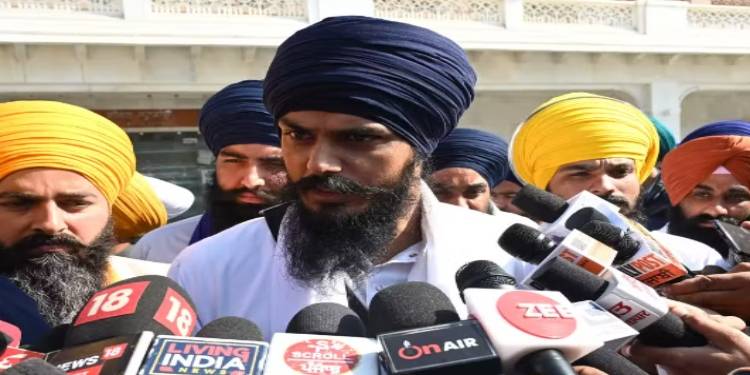
Amritpal Singh, a Khalistan activist, was arrested by Indian police after they had been looking for him for more than a month in an effort to stop the resurgence of an independent homeland in the Indian Punjab.
The emergence of Amritpal Singh, a leader of the Khalistan movement, has reignited the discussion of an independent Sikh country.
It is pertinent to mention here that the Indian government killed tens of thousands of Sikhs in the 1980s and early 1990s to crush the Khalistan movement.
Sukhchain Singh Gill, a senior officer of the Indian Punjab police, told the media that Amritpal Singh had been detained in the Rode village of the Moga region of Punjab ‘on the basis of specific intelligence.’
Indian police have accused 30-year-old activist Amritpal Singh of attempted murder, obstruction of law enforcement, and creating disharmony, apparently to detain the Sikh leader and suppress the demand for a separate homeland for Sikhs.
Amritpal Singh leads a group known as Waris Punjab De (the heirs of Punjab).
Indian police claimed that the Khalistan activist had been on the run since mid-March.
The National Security Act, which permits anyone considered a ‘threat to the nation's security’ to be held without prosecution for up to a year, was used to arrest Amritpal Singh in the local gurudwara, a Sikh temple, the Indian police officer said.
The police officer said that Amritpal Singh would be relocated to the state of Assam's Dibrugarh, where some of his accomplices are already detained.
Mr. Singh, who declares his support for the campaign for a separate Sikh nation known as Khalistan, attributes his motivation to preacher Jarnail Singh Bhindranwale, whom the Indian government accuses of being the instigator of an armed rebellion in the 1980s. In 1984, when the Indian army stormed the Golden Temple, the most sacred site in the Sikh religion, Bhindranwale was slain.
The search for Amritpal Singh included the northern Indian states of Punjab, Haryana, Uttar Pradesh, and Uttarakhand, in addition to the nation's capital, Delhi. At India's request, Nepal also added him to their list of those under monitoring.
Large-scale rallies were organized by Sikhs living in Canada against Indian government action in Punjab. Additionally, demonstrations were organized outside the Indian High Commission in London, and the Indian flag was taken down.
Pro-Khalistan activists gathered in San Francisco outside the Indian consulate to demand Amritpal Singh's release.
The emergence of Amritpal Singh, a leader of the Khalistan movement, has reignited the discussion of an independent Sikh country.
It is pertinent to mention here that the Indian government killed tens of thousands of Sikhs in the 1980s and early 1990s to crush the Khalistan movement.
Sukhchain Singh Gill, a senior officer of the Indian Punjab police, told the media that Amritpal Singh had been detained in the Rode village of the Moga region of Punjab ‘on the basis of specific intelligence.’
Indian police have accused 30-year-old activist Amritpal Singh of attempted murder, obstruction of law enforcement, and creating disharmony, apparently to detain the Sikh leader and suppress the demand for a separate homeland for Sikhs.
Amritpal Singh leads a group known as Waris Punjab De (the heirs of Punjab).
Indian police claimed that the Khalistan activist had been on the run since mid-March.
The National Security Act, which permits anyone considered a ‘threat to the nation's security’ to be held without prosecution for up to a year, was used to arrest Amritpal Singh in the local gurudwara, a Sikh temple, the Indian police officer said.
The police officer said that Amritpal Singh would be relocated to the state of Assam's Dibrugarh, where some of his accomplices are already detained.
Mr. Singh, who declares his support for the campaign for a separate Sikh nation known as Khalistan, attributes his motivation to preacher Jarnail Singh Bhindranwale, whom the Indian government accuses of being the instigator of an armed rebellion in the 1980s. In 1984, when the Indian army stormed the Golden Temple, the most sacred site in the Sikh religion, Bhindranwale was slain.
The search for Amritpal Singh included the northern Indian states of Punjab, Haryana, Uttar Pradesh, and Uttarakhand, in addition to the nation's capital, Delhi. At India's request, Nepal also added him to their list of those under monitoring.
Large-scale rallies were organized by Sikhs living in Canada against Indian government action in Punjab. Additionally, demonstrations were organized outside the Indian High Commission in London, and the Indian flag was taken down.
Pro-Khalistan activists gathered in San Francisco outside the Indian consulate to demand Amritpal Singh's release.

